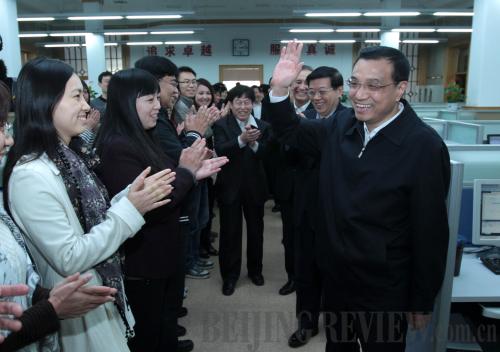|
 |
|
ACKNOWLEDGEMENT: Li Keqiang, current Chinese Premier, pays an inspection visit to the Development Research Center of the State Council on November 10, 2011, while serving as vice premier (PANG XINGLEI) |
At the annual Central Economic Conference in 2012, Xi Jinping, General Secretary of the CPC Central Committee, demanded establishing decision-making consulting mechanisms and developing think tanks that are capable of assisting decision-makers and researching topics before practical needs emerge.
Just one month after he was elected president of China in March 2013, Xi expressed his approval and comments in a proposal on building think tanks with Chinese characteristics. Experts believe the message behind Xi's approval includes making think tanks a part of national strategy and a component of China's soft power.
The Third Plenary Session of the 18th CPC Central Committee in November 2013 adopted the Decision on Some Major Issues Concerning Comprehensively Deepening the Reform, which mandates enhancing the construction of think tanks with Chinese characteristics and establishing a complete consulting system for decision-makers.
Professor Hu Angang, Director of the Center for China Studies of Tsinghua University, was invited to participate in the drafting of China's five-year plans for socioeconomic development several times. He said that think tanks with Chinese characteristics should be based on reform efforts in China, study problems native to this country, as well as form their own work styles and research principles.
The plenum also decided to establish a national security commission to improve systems and strategies for national security. Anthony Yuen, a commentator from Hong Kong-based Phoenix TV, said that this new organization "is a think tank to some extent." Zhang Guoqing, a senior research fellow with the Institute of American Studies under the Chinese Academy of Social Sciences, also commented that the founding of the new commission would lead to an upgrade of China's think-tank system.
Comprehensive development
Right before the opening of the Third Plenary Session of the 18th CPC Central Committee, President Xi met with foreign consultants of the School of Economics and Management of Tsinghua University. "As globally renowned businessmen, you have brilliant insight to the global economy and the Chinese economy. I would love to listen to your opinions. Your suggestions can inspire the Chinese Government," Xi said. Some foreign media outlets interpreted the meeting as Xi seeking advice for China's new reform efforts.
Since the beginning of 2002, consultants of the School of Economics and Management of Tsinghua University have been received by several state leaders.
Founded in 1984, the school's first dean was China's former premier Zhu Rongji. In October 2000, Zhu, who had assumed the premiership, advocated the establishment of a consultant committee in the school. "Through this consultant committee, we could learn management experience from successful companies as well as the curriculum and teaching methods of the best management schools in the world," Zhu said.
The current foreign consultants of the committee include David M. Rubenstein, a co-founder and co-CEO of The Carlyle Group, a U.S. venture capital firm; Dominic Barton, managing Director of McKinsey & Company; Daniel Akerson, former Chairman and CEO of General Motors; and Tim Cook, CEO of Apple Inc. Among its Chinese consultants are top government officials on economic affairs, such as Vice Premier Ma Kai, Governor Zhou Xiaochuan of the People's Bank of China, Minister of Finance Lou Jiwei and Liu He, Director of the Office of the Central Leading Group on Financial and Economic Affairs.
Some successful Chinese entrepreneurs also made it into the consultant committee, such as Jack Ma, Executive Chairman of the Alibaba Group, China's largest e-commerce business, and Robin Li, Chairman and CEO of the Baidu Inc. that operates the world's largest Chinese Internet search engine.
The Chinese Government has attached increasing importance to the role of higher learning institutions as think tanks. During a seminar in Beijing in May 2013, Vice Premier Liu Yandong said that colleges and universities should rely on their advantages in their complete disciplinary system and human resources to become "consultants to decision-makers and evaluators of policies."
"As think tanks, higher learning institutions could exert significant impacts on decision-makers and society in general through unique ideas and opinions. They are in greater demand than ever before and embracing this historic opportunity to make a bigger contribution to society," said Professor Hu at Tsinghua University. Hu revealed that during the drafting of the 12th Five-year Plan (2011-15), higher learning institutions undertook more than half of the 80 strategic research programs.
| 